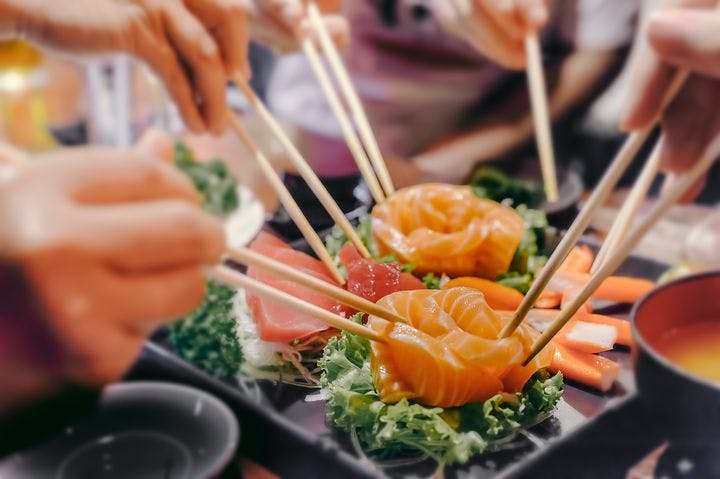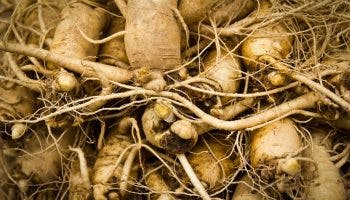Are Raw Foods Good for You?
Published | 5 min read
Raw foods such as salads and sashimi are generally nutritious and popular meal choices. Traditional Chinese Medicine, however, has a different viewpoint on these.

Malaysians are big fans of raw foods like sashimi, vegetable or fruit salads, and cold-pressed juices. Most people think eating raw foods is healthy because there are little to no oils in the preparation. While it has many benefits, it can also be a potential health risk if the foods aren’t prepared ri
Here are a few tips on food preparation without compromising the nutritional quality of various ingredients.
What are the Pros and Cons of Eating Raw Foods?
Fresh, uncooked food can supplement your body with a wealth of essential nutrients, including:
- Vitamins and minerals
- Fibre: Aids digestion and promotes healthy bowel movement
- Phytochemicals: Plant compounds that support immune system functions, prevent cell and DNA damage, reduce inflammation, and slow the growth of some cancer cells
However, a preference for a raw vegan diet deprives your body of calcium, iron, zinc, selenium protein, omega-3 fatty acids and vitamins B12 and D.
In addition to a lack of vitamins, raw meat and eggs may contain bacteria – salmonella, listeria, Campylobacter, and E. coli – that cause food poisoning. Pregnant women, children under five, and adults over 70 should abstain from eating these foods raw.
In Traditional Chinese Medicine (TCM), it’s believed that raw foods are cool-natured and eating them frequently can disrupt
“Eating many types of raw food will disrupt your body’s internal harmony, and lead to digestive disorders and cold feet and hands.
Eu Yan Sang Physician Wong Si Xuan
Food Preparation Tips for Good Health
The safest way to prepare food is to cook it to an internal temperature of 75˚C or hotter. Once cooked, eat your food promptly.
Keep meals that will go bad after a day at a temperature higher than 60°C. Otherwise, it’s best to let them cool before transferring to a container and storing them in your fridge or freezer.
Taking different approaches when cooking meat

You can cook steak, chops, and cuts of red meat to different degrees of doneness, as the bacteria that cause food poisoning are mostly on the surface.
But if you’re pregnant or have a compromised immune system, cook your meat thoroughly. Do the same for whole chicken, sausages, and minced and stuffed meats to avoid foodborne illnesses. Fish must be cooked until it flakes easily with a fork.
Paying close attention to the type of fat used
Picking the right type of oils and fats to cook with goes a long way in helping you make better eating choices. Trans fats should be avoided at all costs, as they can trigger inflammation and make you vulnerable to chronic conditions.
Saturated fats – found in meat, butter, and coconut oil – are believed to increase low-density lipoprotein (LDL) cholesterol levels and may increase your risk of circulatory blockages. Because of this, nutrition experts recommend limiting this fat type to less than 10% of your daily calorie intake.
Still, studies find that there isn’t enough evidence to link saturated fats to heart disease. These studies also suggest that switching to unsaturated fats – corn, olive, and sunflower oils – may be a better alternative. If you’d rather be safe than sorry, try these switches:
- Corn starch
- Pesto, chutney, and salsa
- Stock, vinegar, wine, fruit juices, or water
- Reduced fat milk and yoghurt, or evaporated skim milk
Retaining the nutritional value of vegetables

- Scrub potatoes and other tuber vegetables instead of peeling them
- Boil carrots, tomatoes, and potatoes
- Steam or stir-fry green vegetables, cauliflower, pumpkin, potatoes, and tomatoes
- Bake or roast broccoli, asparagus, cauliflower, carrots, and potatoes
- Grill or griddle artichokes, asparagus, broccoli, celery, eggplant, green beans, onions, spinach, and Swiss chard
When preparing dishes which contain green vegetables, it’s also good to know that cooking over a fire is considered yang (Heat). It dries, hardens, and shrinks the vegetables, and makes them difficult to digest. On the contrary cooking with water is yin (Cold), allows for easier digestion, and is safe for all body constitutions.
Eating food according to your body type
TCM cautions that some types of food may do more harm than good if you have specific internal imbalances. For example, if you lack yang energy, it’s best to stay away from bitter gourd, raw foods, and iced beverages.
A shortage of vital substances – blood and qi – meanwhile, can weaken your digestive system. Because of this, you should limit cool-natured, spicy, fried, and heaty
Although raw foods are beneficial, you should determine your health condition before eating them. Consult a TCM practitioner to choose foods that suit your body type if you’re unsure.
With this knowledge of raw foods, would you consider including or reducing them in your diet? Tell us in the comments below.
References
- Cleveland Clinic. 2021. Raw Food Diet: Is It Healthier? [online] [Accessed 22 February 2023]
- NSW GOVERNMENT. Raw meat safe eating. [online] [Accessed 22 February 2023]
- Better Health Channel. Food safety when cooking. [online] [Accessed 22 February 2023]
- Reader’s Digest Canada. 14 Fruits and Vegetables You Shouldn’t Peel—And 9 You Should. [online] [Accessed 22 February 2023]
Share this article on






